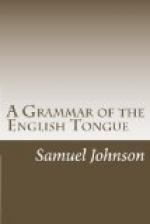In these observations it is easy to discover great sagacity and great extravagance, an ability to do much defeated by the desire of doing more than enough. It may be remarked,
1. That Wallis’s derivations are often so made, that by the same license any language may be deduced from any other.
2. That he makes no distinction between words immediately derived by us from the Latin, and those which being copied from other languages, can therefore afford no example of the genius of the English language, or its laws of derivation.
3. That he derives from the Latin, often with great harshness and violence, words apparently Teutonick; and therefore, according to his own declaration, probably older than the tongue to which he refers them.
4. That some of his derivations are apparently erroneous.
* * * * *
Syntax.
The established practice of grammarians requires that I should here treat of the Syntax; but our language has so little inflection, or variety of terminations, that its construction neither requires nor admits many rules. Wallis, therefore, has totally neglected it; and Jonson, whose desire of following the writers upon the learned languages made him think a syntax indispensably necessary, has published such petty observations as were better omitted.
The verb, as in other languages, agrees with the nominative in number and person; as, Thou fliest from good; He runs to death.
Our adjectives and pronouns are invariable.
Of two substantives the noun possessive is in the genitive; as, His father’s glory; The sun’s heat.
Verbs transitive require an oblique case; as, He loves me; You fear him.
All prepositions require an oblique case: as, He gave this to me; He took this from me; He says this of me; He came with me.
* * * * *
Prosody.
It is common for those that deliver the grammar of modern languages, to omit the Prosody. So that of the Italians is neglected by Buomattei; that of the French by Desmarais; aad that of the English by Wallis, Cooper, and even by Jonson, though a poet. But as the laws of metre are included in the idea of grammar, I have thought proper to insert them.
Prosody comprises orthoepy, or the rules of pronunciation; and orthometry, or the laws of versification.




